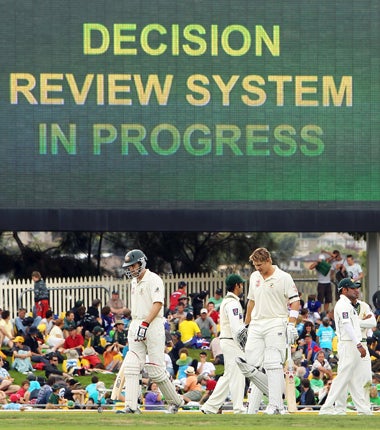Your support helps us to tell the story
From reproductive rights to climate change to Big Tech, The Independent is on the ground when the story is developing. Whether it's investigating the financials of Elon Musk's pro-Trump PAC or producing our latest documentary, 'The A Word', which shines a light on the American women fighting for reproductive rights, we know how important it is to parse out the facts from the messaging.
At such a critical moment in US history, we need reporters on the ground. Your donation allows us to keep sending journalists to speak to both sides of the story.
The Independent is trusted by Americans across the entire political spectrum. And unlike many other quality news outlets, we choose not to lock Americans out of our reporting and analysis with paywalls. We believe quality journalism should be available to everyone, paid for by those who can afford it.
Your support makes all the difference.The International Cricket Council's Chief Executives' Committee has unanimously agreed to the mandatory use of a modified version of the Decision Review System in all Test matches and one-day internationals.
The CEC met today in Hong Kong as part of the governing body's annual conference, with DRS among the main issues up for discussion.
The Board of Control for Cricket in India had opposed the use of DRS in matches because of their concern over the accuracy of 'hawkeye' or ball-tracking technology.
However, the modified version will now consist of infra-red cameras (Hot Spot) and audio tracking devices - the so-called 'snickometer'.
A statement from the ICC said: "The CEC today unanimously recommended universal standards for the usage of technology in decision-making (Decision Review System) in all Test matches and One-Day Internationals subject to availability and commercial considerations.
"The agreed standards will include infra-red cameras (Hot Spot)and audio-tracking devices.
"The CEC also agreed that further independent and expert research will be carried out into ball-tracking technology and its accuracy and reliability.
"The continued use of ball-tracking technology as a decision-making aid will depend on bilateral agreement between the participating members."
In addition to their recommendations over DRS, the CEC were also in favour of a qualification process for the 2015 Cricket World Cup, paving the way for Ireland to play in the tournament.
The ICC had opted to exclude Ireland and their fellow Associate members from the competition, instead restricting the World Cup to just the 10 full-member nations.
However, April's decision drew widespread criticism and prompted ICC president Sharad Pawar to call for a review.
Today's statement continued: "The CEC recommended that there should be a qualification process for the ICC Cricket World Cup 2015 but did not make a recommendation to the ICC executive board on the number of teams that should compete in the event to be held in Australia and New Zealand."
One-day internationals could also see some changes with the restriction of powerplays to between the 16th and 40th overs, plus the use of two new balls per innings - one from each end.
The use of runners in international cricket is also set to be abolished while team captains face stricter sanctions for slow over-rates during matches.
All of these recommendations have been put forward to the ICC's executive board, who will meet over the next two days.
If ratified, they will come into effect from the start of October.

Join our commenting forum
Join thought-provoking conversations, follow other Independent readers and see their replies
Comments